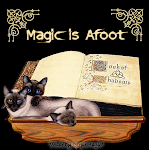HEKATE (or Hecate) was the goddess of magic, witchcraft, the night, moon, ghosts and necromancy. She was the only child of the Titanes Perses and Asteria from whom she received her power over heaven, earth, and sea.
Hekate assisted Demeter in her search for Persephone, guiding her through the night with flaming torches. After the mother-daughter reunion became she Persephone's minister and companion in Haides.
Two metamorphosis myths describe the origins of her animal familiars: the black she-dog and the polecat (a mustelid house pet kept to hunt vermin). The bitch was originally the Trojan Queen Hekabe, who leapt into the sea after the fall of Troy and was transformed by the goddess into her familiar. The polecat was originally the witch Gale who was transformed into the beast to punish her for her incontinence. Other say it was Galinthias, the nurse of Alkmene, transformed by the angry Eileithyia, but received by Hekate as her animal.
Hekate was usually depicted in Greek vase painting as a woman holding twin torches. Sometimes she was dressed in a knee-length maiden's skirt and hunting boots, much like Artemis. In statuary Hekate was often depicted in triple form as a goddess of crossroads.
Hekate was identified with a number of other goddesses, including Artemis and Selene (Moon), the Arkadian Despoine, the sea-goddess Krataeis, the goddess of the Taurian Khersonese (of Skythia), the Kolkhian Perseis, and Argive Iphigeneia, the Thracian goddesses Bendis and Kotys, Euboian Maira (the dog-star), Eleusinian Daeira and the Boiotian Nymphe Herkyna.
HE′CATE (Hekatê), a mysterious divinity, who, according to the most common tradition, was a daughter of Persaeus or Perses and Asteria, whence she is called Perseis. (Apollod. i. 2. § 4; Apollon. Rhod. iii. 478.) Others describe her as a daughter of Zeus and Demeter, and state that she was sent out by her father in search of Persephone (Schol. ad Tleocrit. ii. 12); others again make her a daughter of Zeus either by Pheraea or by Hera (Tzetz. ad Lyc. 1175; Schol. ad Theocrit. ii. 36) ; and others, lastly, say that she was a daughter of Leto or Tartarus. (Procl. in Plat. Cratyl. p. 112 ; Orph. Argon. 975.) Homer does not mention her. According to the most genuine traditions, she appears to have been an ancient Thracian divinity, and a Titan, who, from the time of the Titans, ruled in heaven, on the earth, and in the sea, who bestowed on mortals wealth, victory, wisdom, good luck to sailors and hunters, and prosperity to youth and to the flocks of cattle; but all these blessings might at the same time be withheld by her, if mortals did not deserve them. She was the only one among the Titans who retained this power under the rule of Zeus, and she was honoured by all the immortal gods.
She also assisted the gods in their war with the Gigantes, and slew Clytius. (Hes. Theog. 411-452; Apollod. i. 6. § 2.) This extensive power possessed by Hecate was probably the reason that subsequently she was confounded and identified with several other divinities, and at length became a mystic goddess, to whom mysteries were celebrated in Samothrace (Lycoph. 77; Schol. ad Aristoph. Pac. 277) and in Aegina. (Paus. ii. 30. § 2; comp. Plut. de Flum. 5.) For being as it were the queen of all nature, we find her identitied with Demeter, Rhea (Cybele or Brimo); being a huntress and the protector of youth, she is the same as Artemis (Curotrophos); and as a goddess of the moon, she is regarded as the mystic Persephone. (Hom. Hymn. in Cer. 25, with the commentat.; Paus. i. 43, § 1.) She was further connected with the worship of other mystic divinities, such as the Cabeiri and Curetes (Schol. ad Theocrit. ii. 12; Strab. x. p. 472), and also with Apollo and the Muses. (Athen. xiv. p. 645; Strab. x. p. 468.) The ground-work of the above-mentioned confusions and identifications, especially with Demeter and Persephone, is contained in the Homeric hymn to Demeter; for, according to this hymn, she was, besides Helios, the only divinity who, from her cave, observed the abduction of Persephone. With a torch in her hand, she accompanied Demeter in the search after Persephone; and when the latter was found, Hecate remained with her as her attendant and companion. She thus becomes a deity of the lower world; but this notion does not occur till the time of the Greek tragedians, though it is generally current among the later writers. She is described in this capacity as a mighty and formidable divinity, ruling over the souls of the departed ; she is the goddess of purifications and expiations, and is accompanied by Stygian dogs. (Orph. Lith. 48; Schol. ad Theocr l. c. ; Apollon. Rhod. iii. 1211; Lycoph. 1175; Horat. Sat. i. 8. 35; Virg. Aen. vi. 257.) By Phorcos she became the mother of Scylla. (Apollon. Rhod. iv. 829 ; comp. Hom. Od. xii. 124.) There is another very important feature which arose out of the notion of her being an infernal divinity, namely, she was regarded as a spectral being, who at night sent from the lower world all kinds of demons and terrible phantoms, who taught sorcery and witchcraft, who dwelt at places where two roads crossed each other, on tombs, and near the blood of murdered persons. She herself too wanders about with the souls of the dead, and her approach is announced by the whining and howling of dogs. (Apollon. Rhod. iii. 529, 861, iv. 829; Theocrit. l. c. ; Ov. Heroid. xii. 168, Met. xiv. 405; Stat. Theb. iv. 428 ; Virg. Aen. iv. 609; Orph. Lith. 45, 47; Eustath. ad Hom. p. 1197, 1887; Diod. iv. 45.) A number of epithets given her by the poets contain allusions to these features of the popular belief, or to her form. She is described as of terrible appearance, either with three bodies or three heads, the one of a horse, the second of a dog, and the third of a lion. (Orph. Argon. 975, &c.; Eustath. ad Hom. pp. 1467, 1714.) In works of art she was some-times represented as a single being, but sometimes also as a three-headed monster. (Paus. ii. 28. § 8. 30. § 2.) Besides Samothrace and Aegina, we find express mention of her worship at Argos (Paus. ii. 30. § 2.) and at Athens, where she had a sanctuary under the name of Epipurgidia, on the acropolis, not far from the temple of Nice. (Paus. ii. 30. § 2.) Small statues or symbolical representations of Hecate (hekataia) were very numerous, especially at Athens, where they stood before or in houses, and on spots where two roads crossed each other; and it would seem that people consulted such Hecataea as oracles. (Aristoph. Vesp. 816, Lysistr. 64; Eurip. Med. 396; Porphyr. de Abstin. ii. 16; Hesych. s. v. Hekataia). At the close of every month dishes with food were set out for her and other averters of evil at the points where two roads crossed each other; and this food was consumed by poor people. (Aristoph. Plot. 596 ; Plut. Synmpos. vii. 6.) The sacrifices offered to her consisted of dogs, honey, and black female lambs. (Plut Quaest. Rom. 49; Schol. ad Theocrit. ii. 12 ; Apollon. Rhod. iii. 1032.)
Source: Dictionary of Greek and Roman Biography and Mythology.
Hekate was one of the Titan-gods who allied themselves with Zeus.
Hesiod, Theogony 404 ff (trans. Evelyn-White) (Greek epic C8th or C7th B.C.) :
"Hekate whom Zeus the son of Kronos honoured above all. He gave her splendid gifts, to have a share of the earth and the unfruitful sea. She received honour also in starry heaven, and is honoured exceedingly by the deathless gods . . . For as many as were born of Gaia (Earth) and Ouranos (Heaven) [the Titanes] amongst all these she has her due portion. The son of Kronos [Zeus] did her no wrong nor took anything away of all that was her portion among the former Titan gods: but she holds, as the division was at the first from the beginning, privilege both in earth, and in heaven, and in sea. Also, because she is an only child, the goddess receives not less honour, but much more still, for Zeus honours her."
For MORE information on the Titan-War see THE TITANES
Homeric Hymn 2 to Demeter 19 ff (trans. Evelyn-White) (Greek epic C7th - 4th B.C.) :
"Then she [Persephone] cried out shrilly [as she was seized by the god Haides] with her voice, calling upon her father, the Son of Kronos [Zeus], who is most high and excellent. But no one, either of the deathless gods or mortal men, heard her voice, nor yet the olive-trees bearing rich fruit: only tender-hearted Hekate, bright-coiffed, the daughter of Persaios, heard the girl from her cave, and the lord Helios (the Sun) . . .
Then for nine days queenly Deo [Demeter] wandered over the earth with flaming torches in her hands, so grieved that she never tasted ambrosia and the sweet draught of nektaros, nor sprinkled her body with water. But when the tenth enlightening dawn had come, Hekate, with a torch in her hands, met her, and spoke to her and told her news: `Queenly Demeter, bringer of seasons and giver of good gifts, what god of heaven or what mortal man has rapt away Persephone and pierced with sorrow your dear heart? For I heard her voice, yet saw not with my eyes who it was. But I tell you truly and shortly all I know.'
So, then, said Hekate. And the daughter of rich-haired Rheia answered her not, but sped swiftly with her, holding flaming torches in her hands. So they came to Helios (the Sun), who is watchman of both gods and men, and stood in front of his horses: and the bright goddess enquired of him."
Homeric Hymn 2 to Demeter 436 ff :
"[After Persephone was returned from the underworld to Demeter :] Then bright-coiffed Hekate came near to them, and often did she embrace the daughter of holy Demeter: and from that time the lady Hekate was minister and companion to Persephone."
Pausanias, Description of Greece 9. 39. 2 (trans. Jones) (Greek travelogue C2nd A.D.) :
[In the following passage, Herkyna, the Warding Dog (eruô, kunos), may be Hekate:]
"[The city Lebadeia, Boiotia] is separated from the grove of [the chthonian oracular daimon] Trophonios by the river Herkyna. They say that here Herkyna, when playing with Kore [Persephone], the daughter of Demeter, held a goose (khên) which against her will she let loose. The bird flew into a hollow cave and hid under a stone; Kore entered and took the bird as it lay under the stone. The water flowed, they say, from the place where Kore took up the stone, and hence the river received the name Herkyna. On the bank of the river there is a temple of Herkyna, in which is a maiden holding a goose in her arms. In the cave are the sources of the river and images standing, and serpents are coiled around their sceptres. One might conjecture the images be of Asklepios and Hygeia, but they might be Trophonios and Herkyna, because they think that serpents are just as much sacred to Trophonios as Asklepios."
For MORE information on Persephone's abduction see RAPE OF PERSEPHONE
Hekate was probably described as the consort of Khthonian (Underworld) Hermes in the cults of Thessalian Pherai and Eleusis. Both gods were leaders of the ghosts of the dead, and were associated with the spring-time return of Persephone.
Pausanias, Description of Greece 1. 38. 7 (trans. Jones) (Greek travelogue C2nd A.D.) :
"The hero Eleusis, after whom the city [of Eleusis] is named, some assert to be a son of Hermes and of Daeira [Hekate?], daughter of Okeanos."
Propertius, Elegies 2. 29c (trans. Goold) (Roman elegy C1st B.C.) :
"Brimo [Hekate?], who as legend tells, by the waters of Boebeis [in Thessalia] laid her virgin body at Mercurius’ [Hermes’] side."
Antoninus Liberalis, Metamorphoses 29 (trans. Celoria) (Greek mythographer C2nd A.D.) :
"At Thebes Proitos had a daughter Galinthias. This maiden was playmate and companion of Alkmene, daughter of Elektryon. As the birth throes for Herakles were pressing on Alkmene, the Moirai (Fates) and Eileithyia (Birth-Goddess), as a favour to Hera, kept Alkmene in continuous birth pangs. They remained seated, each keeping their arms crossed. Galinthias, fearing that the pains of her labour would drive Alkmene mad, ran to the Moirai and Eleithyia and announced that by desire of Zeus a boy had been born to Alkmene and that their prerogatives had been abolished.
At all this, consternation of course overcame the Moirai and they immediately let go their arms. Alkmene’s pangs ceased at once and Herakles was born. The Moirai were aggrieved at this and took away the womanly parts of Galinthias since, being but a mortal, she had deceived the gods. They turned her into a deceitful weasel (or polecat), making her live in crannies and gave her a grotesque way of mating. She is mounted through the ears and gives birth by bringing forth her young through the throat. Hekate felt sorry for this transformation of her appearance and appointed her a sacred servant of herself."
Aelian, On Animals 12. 5 (trans. Scholfield) (Greek natural history C2nd A.D.) :
"The inhabitants of Thebes, although Greeks, worship a marten [Galanthis], so I hear, and allege that it was the nurse of Herakles, or if it was not the nurse, yet when Alkmene was in labour and unable to bring her child to birth, the marten ran by her and loosed the bonds of her womb, so that Herakles was delivered and at once began to crawl."
Aelian, On Animals 15. 11 (trans. Scholfield) (Greek natural history C2nd A.D.) :
"I have heard that the land-marten (or polecat) was once a human being. It has also reached my hearing that Gale was her name then; that she was a dealer in spells and a sorceress (Pharmakis); that she was extremely incontinent, and that she was afflicted with abnormal sexual desires. Nor has it escaped my notice that the anger of the goddess Hekate transformed it into this evil creature. May the goddess be gracious to me : fables and their telling I leave to others."
Odysseus received Queen Hekabe as his captive followingr the fall of Troy. During the voyage back to Greece she murdered a Thracian king and was stoned by the locals. The gods then transformed her into a black dog, and she became the animal familiar of the goddess Hekate. In this myth the queen was clearly identified with Bendis, the Thrakian Hekate, who was offered dogs in sacrifice.
Lycophron, Alexandra 1174 ff (trans. Mair) (Greek poet C3rd B.C.) :
"The maiden daughter of Perseus, Brimo Trimorphos (Three-formed), shall make thee [Queen Hekabe of Troy] her attendant [after her transformed into a dog], terrifying with thy baying in the night all mortals who worship not with torches the images of Zerynthia [Hekate] queen of Strymon [in Thrake], appeasing the goddess of Pherai with sacrifice. And the island spur of Pakhynos [in Sikelia, Sicily] shall hold thine [Hekabe’s] awful cenotaph, piled by the hands of thy master [Odysseus], prompted by dreams when thou hast gotten the rites of death in front of the streams of Heloros. He [Odysseus] shall pour on the shore offerings for thee, unhappy one, fearing the anger of the three-necked goddess [Hekate], for that he shall hurl the first stone at thy [Hekabe's] stoning and begin the dark sacrifice to Haides."
Pseudo-Hyginus, Fabulae 111 (trans. Grant) (Roman mythographer C2nd A.D.) :
"When Ulysses was taking into servitude Hecuba, Priam's wife . . . she threw herself into the Hellespont, and is said to have been changed into a dog. the place is called Cyneus (of the Dog) from this."
Ovid, Metamorphoses 14. 430 & 561 ff (trans. Melville) (Roman epic C1st B.C. to C1st A.D.) :
"Troy fell and Priam too. His ill-starred wife [Hekabe] lost, after all besides her human shape; her weird new barking terrified the breeze on foreign shores where the long Hellespont contracts in narrows . . . There lie across the strait from Phrygia, where Ilium was, the provinces of Thrace, where Polymestor had his wealthy palace. To him in secret Praim gave in charge his young son Polydorus to be reared . . . When Troy;s fair fortune fell, that wicked king took his sharp sword and slit his charge's throat . . .
Upon the beach cast up she [Hekabe] saw her Polydorus' corpse and the huge wounds the Thracian knives had made . . . Hecuba, rage linked with grief, oblviious of her years . . . made her way to Polymestor, author of that foul murder, and sought an audience . . . She attacked the king and dug her fingers in his eyes, his treacherous eyes, and gouged his eyeballs out . . . Incensed to see their king's calamity, the Thracians started to attack the queen with sticks and stones, but she snaped at the stones, snarling, and whn her lips were set to grame words and she tried to speak, she barked. The place remains today, named from what happened there [Kynossema, or Dog's Barrow]. Then still remembering her ancient ills, she howled in sorrow through the land of Thrace. That fate of hers stirred pity in the hearts of friend and foe, Trojans and Greeks alike, and all the gods as well--all: Juno [Hera] too, Jove's wife and sister, did herself declare the tragic end of Hecuba unfair."
Ovid, Metamorphoses 7.362 ff :
"Past the tomb of Paris [in the Troad] buried in the shallow sand; the meadowlands that Maera terrified with monstrous barks [N.B. Ovid connects Hekabe or Hekate with the dog-star Seirios or Maira]."
Welcome to my online Book of Shadows.
A good place to come and learn from and share with like-minded Pagans and Wiccans of all Traditions.

glitter-graphics.com

glitter-graphics.com
Wiccan Rede
Subscribe to:
Post Comments (Atom)
Live Traffic Feed
Being

Breath

Courage

Fight for Freedom
Earth Air Fire Water

Talisman
Spellwork
Moon Goddess
Moon Phases
CURRENT MOON





































2 comments:
Thanks for this informative post. Do you think of Hecate as the Crone aspect of the Goddess? I am very much into the Maiden, Mother, Crone aspects of the Goddess, but am drawn into the Hecate aspect also.
Peace, Happiness and Abundance to ALL !
I love this blog! I am going to link this on a Wiccan facebook page! you should check it out.
https://www.facebook.com/WiccansSettingItStraight
Post a Comment